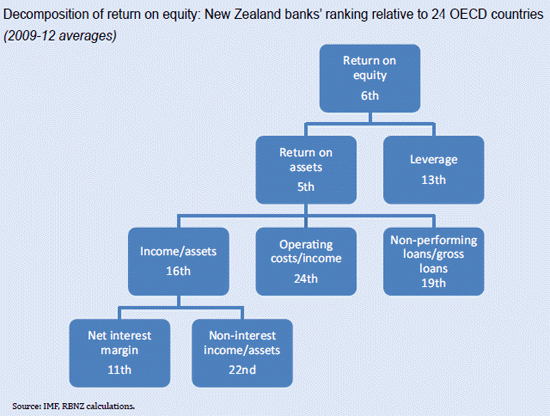
By Gareth Vaughan
The New Zealand banking system is "highly profitable in an international sense", the Reserve Bank says, because it's operationally efficient - partly due to being early adopters of new technology - and because banks here weren't hit as hard as overseas counterparts by non-performing loans caused by the global financial crisis (GFC).
In its Financial Stability Report released today the Reserve Bank includes a two page article on measuring financial system efficiency that features a comparison between New Zealand banks' profitability and that of banks in 24 other OECD countries. The Reserve Bank, the prudential regulator of New Zealand's trading banks, adopts a cautious tone to profitability comparisons between banks from different countries.
"Bank financial ratios in the post-2008 period have been heavily affected by economic disruption ,banking stress, and regulatory changes. Cross-country comparisons therefore must be interpreted with caution. Furthermore, cross-country differences in capital structure, business mix, and accounting and tax practices pose further problems for interpretation," the Reserve Bank says.
"It is, however, possible to use accounting relationships to decompose profitability measures into their component parts such as leverage, interest margins and operating expenses. Such an analysis can provide insight into the drivers of profitability, and may suggest where inefficiencies exist."
The chart at the foot of this story compares the return on equity (ROE) of the New Zealand banking sector with 24 other OECD countries. The Reserve Bank says this data suggests the New Zealand banking system is "highly profitable in an international sense," coming in sixth out of the 25 countries in terms of ROE.
"The common inference is that high profitability may indicate a lack of competition and be representative of an inefficient market. However, this simple interpretation fails to consider the underlying factors which lead to the relatively high profits in the New Zealand banking sector, and as such may be misleading."
'A high degree of technical efficiency'
The Reserve Bank says the data implies the relatively high ROE is not a function of the banks holding relatively low levels of capital (high leverage), but rather stems from a relatively high return on assets.
"Finer disaggregation reveals that this is primarily due to lower costs-to-income and loan loss provisions (for which we use non-performing loans to- gross loans as a proxy)," the Reserve Bank says.
"The heavy focus on traditional (lower cost) deposit and lending activities, with a lesser focus on insurance and investment banking (higher cost) activity compared to international counterparts can partly explain the New Zealand banking system’s relatively low operating costs-to-income. Nevertheless, compared to other countries with similar banking systems, New Zealand banks’ aggregate cost-to-income ratio is still relatively low which indicates a high degree of technical efficiency."
Additionally low levels of non-performing loans reflect a "relatively mild" GFC in New Zealand, plus effective credit risk assessment and management processes. The Reserve Bank also says New Zealand’s aggregate net interest margin, slightly above the OECD average, may be relatively high due to the less complex nature of the New Zealand banking system.
"However, analysis of mortgage, deposit, and credit card interest margins suggests that New Zealand banks’ interest spreads are similar to other OECD countries, so the cost of financial intermediation on these product lines does not appear to be particularly high in New Zealand," the Reserve Bank says.
"The overall conclusion of this comparative analysis is that the New Zealand banking system is relatively efficient in an operational sense, and this would reflect observational evidence that it has been relatively quick to embrace new technology. It has also not been as badly affected as some other countries by the impact of the GFC on non-performing loans. These appear to be the major drivers of the high relative profitability in the New Zealand banking system."
Meanwhile, the Reserve Bank says liabilities of New Zealand registered banks are equivalent to about 140% of gross domestic product (GDP) , with the four Australian owned banks each having liabilities in excess of 25% of GDP.
"Failure of a bank could cause other (unrelated) banks to fail. This is due to interbank lending, payment system linkages, and potential loss of confidence issues," the Reserve Bank says.



We welcome your comments below. If you are not already registered, please register to comment.
Remember we welcome robust, respectful and insightful debate. We don't welcome abusive or defamatory comments and will de-register those repeatedly making such comments. Our current comment policy is here.